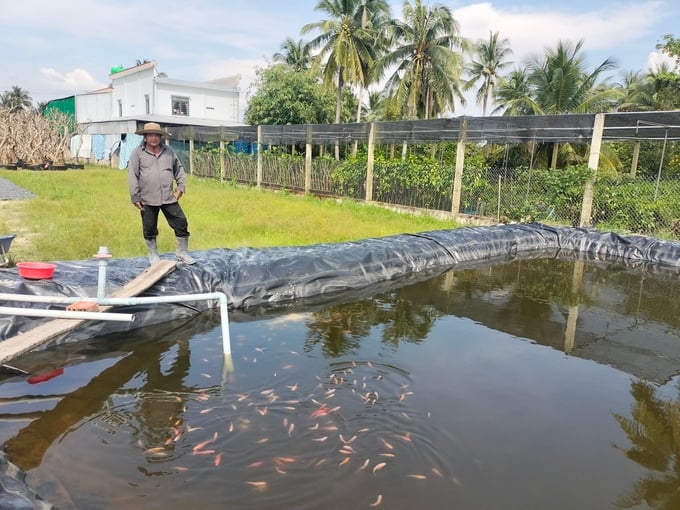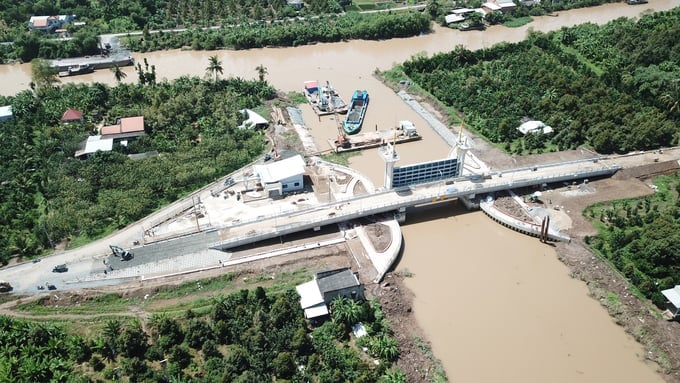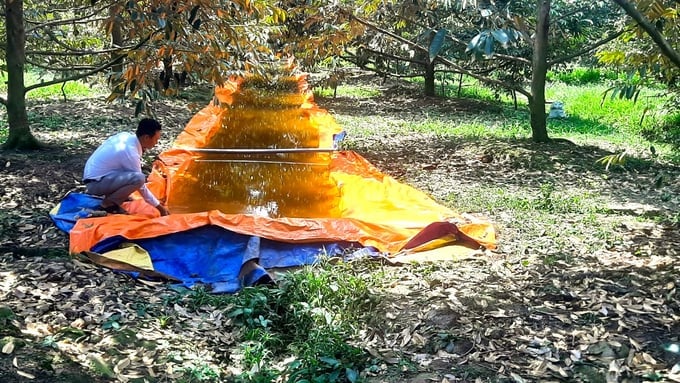November 22, 2025 | 10:08 GMT +7
November 22, 2025 | 10:08 GMT +7
Hotline: 0913.378.918
November 22, 2025 | 10:08 GMT +7
Hotline: 0913.378.918

Farmers in Ben Tre province storing fresh water in floating reservoirs. Photo: Minh Dam.
Saltwater intrusion in the anticipated dry season of 2023-2024 has been projected to occur prematurely and last longer compared to the historical averages. Salinity levels of 1‰ are expected to permeate the entirety Ben Tre province from January to May 2024, with the most affected areas being the Ham Luong and Cua Dai river systems. It is imperative for the local agricultural sector to actively address the challenges posed by saltwater intrusion and safeguard the output of agricultural production.
As a result, the Ben Tre province's Department of Agriculture and Rural Development has urged farmers to consistently monitor saltwater intrusion developments through various communication channels, including radio broadcasts, newspapers, television programs, and the "Accompanying Farmers" initiative. Furthermore, farmers are recommended to implement a range of water storage measures, which include excavating ponds, lining canal beds, and utilizing water storage bags, to cater to both daily needs and agricultural production activities.

The sluice gate at Ben Ro Canal in Tien Long commune, Chau Thanh district, Ben Tre province, is prepared to prevent saltwater intrusion from the Ham Luong River into the upper reaches of the Ba Lai River. Photo: TL.
Farmers need to adhere to the seasonal planting schedule as well as account for the state of local water resources. Additionally, they should monitor and measure the salinity of water before irrigation. Utilizing salt-tolerant plant varieties and applying advanced scientific and technical methods for crop care under restricted fresh water conditions are also essential. Special attention should be given to off-season durian and rambutan farms, and the high volume of ornamental flower baskets for the Lunar New Year.
Regarding livestock production in the coastal districts of Ba Tri, Binh Dai, and Thanh Phu, proactive measures should be taken to stockpile food and drinking water for the herds of livestock. Implementing hygiene measures, detoxification and disinfection of pens and barns, and preventing common diseases in livestock and poultry during the dry season are crucial.
Regarding aquaculture production, constant monitoring of weather and water environment indicators such as temperature, salinity, and pH levels is necessary to timely arrange suitable seed variety and crop schedule. The aquaculture pond system must ensure sufficient water reserves for production, including the construction of qualified sedimentation and water storage ponds. Furthermore, the relocation of aquaculture production to areas unaffected by saltwater intrusion or harvesting when aquaculture products reach their commercial size before high saltwater intrusion occurs is highly advised.

Farmers growing durians in farm ditches to store fresh water and prevent saltwater intrusion. Photo: Minh Dam.
Mr. Huynh Quang Duc, Deputy Director of the Ben Tre province's Department of Agriculture and Rural Development, has advised farmers to close the sluice and ditches on the farms during the saltwater intrusion season. On the other hand, farmers must still keep a high level of humidity within their farms, and prune specific crops before saltwater intrusion occurs. Farmers must also constantly monitor the salinity level to draw water for irrigation when possible. Information dissemination within the community is another crucial aspect.
Mr. Nguyen Chi Dung in Long Thoi commune, Cho Lach district, frequently keeps tracks of the salinity level through local reports as well as various news outlets. Notably, Mr. Dung recently invested tens of millions of Vietnamese dong to buy lining canvas for his ponds, and store 200 cubic meters of fresh water.
"If saltwater intrusion occurs, this amount of stored water can be used to irrigate the family's ornamental flower garden for approximately twenty days. If the saltwater intrusion lasts longer, we will hire a boat to transport fresh water from the upstream. I recently read the news that saltwater intrusion will occur early this year, so I am very worried. Like many fellow farmers producing seedlings and ornamental flowers, especially those with off-season durian farms, I have stored water for irrigation," Mr. Dung expressed his concern.
Farmers in Ben Tre province have been proactive in preventing drought and salinity within the last few years. Namely, farmers producing seedlings in Cho Lach and Mo Cay Bac districts often store fresh water on floating reservoirs, or in plastic bags and ponds. On the other hand, fruit tree farmers often dredge ditches within their farms and lay canvas to store water.
Every year, farmers in Ben Tre province prepare over 1,000 ponds with a capacity of at least 200 cubic meters, and a large number of water bags with varying storage capacities to store water during the saltwater intrusion season.
Translated by Nguyen Hai Long

(VAN) Results from the Sustainable Durian Model Project in Dak Lak have confirmed the critical role of Yara Viet Nam in transferring advanced nutritional solutions to farmers.

(VAN) In Tuyen Quang province, livestock farmers have introduced effective models and innovative practices that significantly strengthen African Swine Fever prevention and control efforts.

(VAN) This is the study conducted by IRRI and Can Tho University on the rice straw value chain in Mekong Delta showing an economic potential of more than 6.6 trillion VND/year.

(VAN) By participating in cooperative economics, many farmers in Tay Ninh have overcome hardship, mastered clean dragon fruit cultivation techniques.

(VAN) The crossbreeding program in the former Binh Dinh province (now part of Gia Lai) has shown signs of decline, and urgent measures are needed to revive it and sustain past achievements.

(VAN) The agricultural sector agreed on a roadmap to pilot the MRV protocol and expand low-emission rice production from the 2025-2026 winter-spring crop.

(VAN) Agricultural extension officers in Quang Ninh do more than transmit knowledge; they have become a steadfast support system for farmers on the path to sustainable agricultural development.